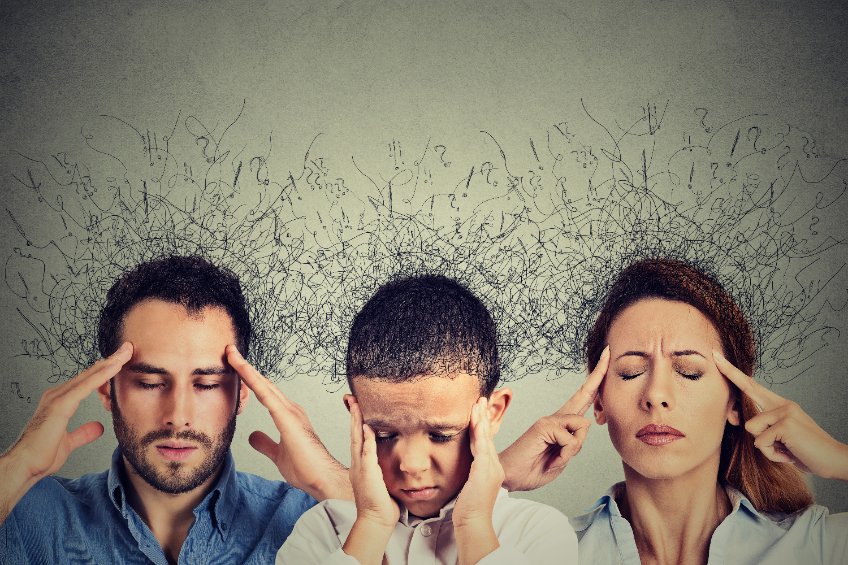ADHD in Relationships

Adult ADHD and Relationships. Do you, your partner or both have ADHD?
“My partner doesn’t notice me anymore”, a common complaint we hear as a relationship therapist.
While there are many reasons why a partner seems distracted and not present, a startling increase in adult ADHD diagnoses suggest we should consider that chronic attention and communication issues may be a sign of something deeper.
Healthy relationships require paying attention to each other’s thoughts and feelings and maintaining empathy and consideration for one another. The presence of ADHD in one or both people in a partnership presents unique challenges to maintaining these fundamental qualities, and can cause significant distress if left unacknowledged.
If you are in a relationship with somebody with ADHD, you may feel regularly lonely and overlooked in your relationship. You may feel your partner doesn’t seem to notice you anymore, and struggles with following up on things – maybe so much that you feel there is another child in the home. You may feel like you are being pushed into someone you are not – a nagging and irritable person, always having to remind your partner to do this, do that.
It may be additionally frustrating that your partner seems to obsess over new things often, but rarely applies that same passion into your relationship.
Perhaps, if you’re very honest with yourself, you’re reading this and thinking this sounds like you.
It didn’t start off this way… so what happened?
What is adult ADHD?
ADHD is a spectrum disorder, meaning there are varying degrees of the symptoms, and these symptoms can manifest differently depending on the personality of a person. Symptoms of ADHD include:
- Short attention span
Does your partner seem to struggle to remain focused on what you are saying? Forget important things you told them just a few days prior?
- Difficulty completing tasks and keeping organised
Maybe you feel like the ‘manager’ of the household, and things would ‘fall apart’ if you weren’t there to pick up the pieces. - Impulsiveness
Do your arguments often center around your partners’ impulse-buying eating into your mutual plans for your next holiday? - Chronic forgetfulness
Do you hear the words “have you seen my phone/wallet/keys” seemingly a hundred times a week? - Easily distractible
Forgetting what they are saying in the middle of a conversation is one example of this… think ,”Ooh! Shiny object!” - Restlessness, inability to sit or stand still for long
Ever feel like you can’t watch a movie without feeling your partner fidgeting constantly next to you? - Talking excessively or in a fast manner, blurting out answers in conversation
Maybe you feel you are hyper-aware of your partner missing social cues when you are out with friends. Sarcasm, hurt feelings, and unspoken messages don’t seem to ‘get through’ to them in the same way as other people.
Is ADHD more common now?
Most experts today agree that ADHD has always been this common, and the increase we are perceiving is more likely a natural result of increased awareness.
Technological advances have vastly increased our access to information, resulting in more people seeking out information on ADHD. Many of us have heard the media-inflated stories of ADHD being the product of poor parenting, too much television, and other obscure scapegoats, however the research strongly points to ADHD being the result of genetics.
Whilst men are slightly more likely to meet criteria for ADHD, new research suggests this gender gap should be taken with a grain of salt. While men are more likely to present as hyperactive, women exhibit more symptoms related to attention deficit, and therefore are more likely to fly under the radar for diagnosis.
The early stages of your relationship – the hyperfocussed courtship
Many who have experienced newfound love with someone with ADHD will fondly recall the early ‘honeymoon period’ as something seemingly straight out of a romance novel.
When we meet someone we are interested in, our ‘love chemicals’ such as dopamine, oxytocin, and norepinephrine are rapidly released, giving us that giddy euphoric feeling we associate with attraction.
Whilst we all experience this phenomenon to a degree, people with ADHD have additional neurological factors that amp up this experience tenfold. Neurological differences in the brain of people with ADHD result in higher thresholds for stimulation and novelty-seeking, resulting in an intense hyper-fixation that we call love bombing. Love bombing can be a very flattering experience for the keen recipient… especially when it comes in the form of spontaneous gifts, deep and meaningful conversations until the early hours of the morning, and grand gestures of affection.
However, this intense level of stimulation eventually becomes overwhelming and impossible to maintain. Once the novelty of your relationships’ shiny ‘newness’ wears off, the person with ADHD will return to their comfortable baseline, ready to obsess over their next object of fascination.
This is not to say that the person with ADHD does not still love their partner post-fixation, rather, the contrast between the love bombing and the post-honeymoon return to normality can feel like baffling whiplash for the non-ADHD partner.
Coupled with the attention deficit aspect of ADHD, many mistake this abrupt shift in dynamic as their partner no longer desiring them or finding them interesting, which feels hurtful and confusing.
When problems start
Your sex life
Sex and intimacy are integral parts of a healthy relationship. The breakdown of ADHD relationships often manifests through the straining of the sexual relationship. The reasons for this can include:
- Negative emotions such as anger, frustration, and sadness spoiling any budding desire to initiate intimacy in the first place. Resentment is the ultimate mood-killer.
- People with ADHD are prone to two polarities of the sexual libido spectrum. Hyposexuality (unusually low sex drive) or hypersexuality (unusually high sex drive) may not match the libido of the non-ADHD partner, affecting the dynamic of the sexual relationship. People with hypersexuality may sacrifice foreplay and make their partner feel unappreciated, whilst people with hyposexuality can find sex over-stimulating or find the ‘relaxation mode’ required for sex too difficult to achieve.
- People with ADHD tend to take their distractions to bed, unintentionally communicating their disinterest in intimacy as their mind flits from topic to topic. The spontaneity and playfulness of sex can be sacrificed by this distractibility.
- Resentment can take hold if the ADHD spouse suddenly focuses on them for sex (but otherwise has paid them no mind). This can be especially relevant for women, who tend to desire a ‘lead up’ to sex in the form of flirtations and advances. Sex then becomes just another chore to tick off as done.

- Relationships in significant breakdown may experience emotional or physical infidelity as a means of escaping the accumulating stresses of the relationship. The betrayal of trust and security that comes from having an affair presents further barriers to accessing intimacy.
- People with ADHD are especially prone to addictive and hyper-stimulating behaviors such as pornography and intense sexual activities, which can harm the natural intimacy of the sexual relationship as more than just a means to an end.
- As communication further breaks down, the connection the couple shares that allows them to laugh off sexual mishaps decreases. This decline in connection and trust results in sex becoming a possible vehicle for failure (and possibly shame) – as such, couples retreat, and sex lessens or becomes monotonous.
Understanding how ADHD can affect the sex life of a couple is crucial to confronting and overcoming bedroom issues.
Partners can benefit from communicating compassionately with one another to ensure connectivity, intimacy, and ample foreplay is at the forefront of both of their minds.
Is it really about laziness?
One of the most common misunderstandings regarding people with ADHD is that their actions (or inactions) are the result of laziness. Simple tasks such as taking the bins out or checking the post can require a huge mental effort for someone with ADHD, and the inability to complete ‘easy’ tasks often results in feelings of failure and low self-worth.
Putting off tasks may come off as lazy to the uninformed observer but is a consequence of the legitimate struggle to take that first step. It is understandably difficult for partners of people with ADHD to remember that these frustrating blips are an expression of neurological differences in the ADHD brain.
With the help of brain imaging technology, ADHD has been re-conceptualized as a reward-deficiency syndrome, meaning that people with ADHD have a deficit of the specific pleasure neurotransmitters that signify reward.
Without these important indicators of reward, people with ADHD struggle to complete tasks that don’t provide immediate satisfaction, and their attentional capacity is inconsistent and easily dysregulated.
“Feeling the future” is difficult if you have ADHD. You have a shorter time horizon, so planning into the future is difficult because future events don’t hit the radar until deadlines become closer to the now.
There you have it; a biological reason for why your husband won’t take the bins out without you reminding him twice every single Thursday!
Painful misinterpretations
One of the most common issues therapists hear from ADHD-presenting couples goes something along the lines of, “he doesn’t even seem to notice me anymore.”
The initial courtship phase sees the ADHD partner hyper-fixated on courting his lover, showering her with his attention and affection as the chemicals associated with infatuation are released. As things progress and the couple become increasingly comfortable with each other, this fixation begins to fade as the ADHD partner becomes accustomed to his partner, and the love chemicals begin returning to their baseline homeostasis.
In response, the non-ADHD partner, who has become pleasantly used to being doted upon, attributes this decreased attention and affection to a painful misinterpretation: he doesn’t want me anymore.
Attempts to amend this often begin with new clothes or lingerie and attempts of increased intimacy, and eventually, frustration and anger when these efforts fall short of providing the validation and attention desired by the partner.
The hurt experienced by both parties here often is compounded: The non-ADHD partner misinterprets her partners’ distractibility as not being in love with her or desiring her anymore. The neutral act of her partners’ distraction takes on a negative association of fear or despair, with every example of distraction reinforcing the belief, ‘he doesn’t love me anymore’.
For the ADHD partner, having weathered frustrations at his ineptitudes all his life mostly by ignoring them, instinctively retreats inwards, thus increasing the perception of disinterest.
Furthermore, given people with ADHD do not input and process information hierarchically, the suffering of his spouse enters his mind and is provided the same attention as other incumbrances (like the fluorescent lights being too bright, the neighbour’s dog incessantly barking).
The hurt caused by the incorrect interpretation that he no longer loves her can create a snowball effect of bad feelings, which act to perpetuate and reinforce the negative behaviours that compound the problem.
Symptom-response-response cycle
Whilst it can be tempting to blame relationship issues on ADHD itself, and it is true that unique challenges present in ADHD relationships, the actual damage sustained is due to a destructive pattern of symptom-response-response that both parties participate in.
The combination of factors – the ADHD symptom of distractibility, the misinterpretation of that distractibility and subsequent resentment, and deeper resentment – amplifies the issue to become the monster it is.
Distractibility alone is not a destructive symptom, but as we note above, it became destructive as the symptom instigating the vicious cycle of symptom-response-response.
ADHD leading expert Melissa Orwell points out that ADHD in relationships can be looked upon as a sort of dance, whereby one partner leads and initiates, but both partners must understand their role within the dynamic to circle the floor.
Whilst it is all well and good for an ADHD partner to address his symptoms, the couple will be unsuccessful if non-ADHD partner’s response does not change also. The key here is to consider both the symptom and the response as contributing factors to create a more realistic picture of the situation, and to promote accountability from both sides of the dynamic.
The easy slide into Parent-Child (Under-functioner/Over-functioner dynamic)
The most destructive of all the patterns in a struggling ADHD relationship is quite possibly the parent-child dynamic. As a result of the chronic inattentiveness and distractibility that is symptomatic of untreated ADHD, the ADHD-partner will routinely forget to follow up on his portion of the household responsibilities and chores, leaving the non-ADHD partner to ‘swoop in’ and sort out.
While he may very well have every good intention to uphold his end of the bargain, he gets distracted or forgets, and his partner ends up overcompensating. This inequality eventually leads to a build up of resentment, in which classically the non-ADHD spouse feels begrudged at having to do all the grunt work, while she perceives the ADHD spouse to be taking a load off.
Eventually, she begins to attack him as her resentment overwhelms, and he retreats, resulting in an even harder attack in an attempt to gain some kind of response and change.
The outcome is both parties become conditioned to learn that communicating with each other is painful, and perhaps cease even trying. When he does get things done, the partner is wary because he is so ‘consistently inconsistent,’ and remembers the many failures over the few accomplishments. She doesn’t give him credit, which demotivates him even further.
The addition of actual children into the dynamic can further complicate a parent-child dynamic of an ADHD couple. Triangulation is common here, with an ‘us versus them’ attitude emerging from the gulf created between the couple as the ‘cranky’ non-ADHD parent versus the ‘fun’ ADHD parent.
The chore wars
Disproportionate sharing of the housework can be a strong symbol of the many things a person doesn’t do in the relationship. In a household of equality, not contributing your fair share can signify a lack of care or respect towards your partner.
 This can add to general unease about the future of the relationship as one built on mutual trust and respect, where challenges are overcome together.
This can add to general unease about the future of the relationship as one built on mutual trust and respect, where challenges are overcome together.
The difficulty maintaining attention [resulting from chemical deficiencies] creates the perfect storm for people with ADHD to neglect their share of the housework. If left unacknowledged and untreated, an imbalance of housework can take the format of the symptom-response-response cycle and can add to the downfall of a relationship.
The blame game
The blame game is the corrosive outcome of what happens when the dynamics of parent-child and chore wars exhaust both spouses, leaving them simmering in perpetual resentment.
The non-ADHD partner blames her ADHD partner for her unhappiness, justifying that his refusal to acknowledge his ADHD or his ineptitude in treating it has caused their issues. The destructive element of the blame game is that the more she blames him, the more his behaviour reinforces her judgement on him, and she begins to believe things will never change.
In contrast, the ADHD spouse is quietly bewildered by his partners’ apparently abrupt changes in behaviour. Unlike the woman he knew when they first met, she constantly nags him, berates him, and patronises him over things that never seemed to bother him when they began dating. Also, she never seems to appreciate how hard he works to support their family.
She blames him for her unhappiness. He blames her for being so angry and controlling. So long as either person is partaking in the blame game, nobody will get anywhere, because the core issue is not being investigated and dealt with.
Blaming can be dangerous for a multitude of reasons:
- Blaming creates a toxic environment whereby experimenting with behaviour change becomes unsafe. You fail, you get blamed.
- Both parties need to look internally at how they are contributing to their relationship distress. Blaming shifts the focus away from the blamer, so that they are unable to consider their own involvement.
- Empathy is paramount to working your way outside of relationship distress. Blaming diminishes both parties’ ability to be empathetic and affects the ability to forgive.
- Rather than viewing the problem together to find a solution, blaming sets people up against each other and builds resentment.
Deciding to stop playing the blame game is by no means easy but is a wonderful move towards a more peaceful middle ground where everybody is treated with respect and empathy.
Pursuit and escape
ADHD couples in times of conflict will often find themselves in a ‘pursuit and escape’ situation. The non-ADHD partner is the aggressor; she nags, escalates conversation, and may even physically follow a spouse around in a desperate bid to get her ADHD spouse to pay attention to her.
This behaviour can be a frantic attempt to get their partner to acknowledge her after being habitually ignored, and may signify a survival strategy; if things don’t change, the relationship will no longer be feasible, so she has no choice but to become more antagonistic.
longer be feasible, so she has no choice but to become more antagonistic.
In response, the ADHD spouse will generally react in one of three ways:
- Compliance, with a high possibility that the behaviour will reappear due to the untreated ADHD symptoms
- Anger or defensiveness as a shame response that delays the conversation
- Denial, avoidance, or non-responsiveness (the most common response)
The common result is that the non-ADHD spouse personalizes the partners’ retreat, attributing meaning as ‘he doesn’t care’. Recurring retreats in the face of such aggressive pursuit for reasonable change begin to result in a sense of hopelessness that things will never get better.
Meanwhile, the escape tactics implemented by the ADHD spouse can cause him greater and greater anxiety.
Nag now, Pay later
Deep down, there are generally understandable reasons for why people nag. If somebody is nagging their partner, it is because they feel they are not able to get attention or assistance without implementing an antagonistic manner of communication.
The context of an ADHD relationship, in which the spouse with ADHD consistently does not follow through, is inattentive, and compulsively retreats, can be a breeding ground for nagging.
But nagging is ineffective in an ADHD relationship, because it does nothing to treat the underlying issue – the ADHD symptoms. Instead, nagging:
- Contributes to the ADHD partners’ compulsion to retreat.
- Significantly contributes to the relationship moving into a parent-child dynamic.
- Reminds the ADHD partner of ingrained shame he has felt all his life, such as the many times he’s been nagged by parents and teachers.
Finding positive and effective ways to communicate outside of nagging is paramount to the survival of a relationship with ADHD.
Losing faith
When the issues in an ADHD relationship consistently are swept under the rug, both partners begin losing faith in themselves and one another as a team.
The reasons they fell in love in the first place become more and more difficult to remember. The spouse with ADHD feels confused and dismayed; after feeling like they finally found somebody that accepts them for all their quirks and oddities, they now feel constantly berated and shamed, even when they feel they are doing their best. They can feel worthless and unreliable, and like a bad partner.
Meanwhile, the partner without ADHD is exhausted from carrying the mental load of the couple, and can feel completely taken for granted, as if they are part of the furniture.
They remember a time when they were light-hearted and happy, but somehow they feel like a bitter and resentful person almost all the time.
When they are together, the conversation no longer flows, and is tainted with an undercurrent of resentment. Making love is rare or non-existent, and they long for the time when they would delight in one another’s company as a true team.
ADHD doesn’t invent problems: It just exacerbates the universal ones.
Its true. Every couple needs to negotiate different desires and ways of doing things. ADHD shortcomings can become the scapegoat – but the universal work of learning to communicate your needs and wants with love, understanding and empathy for your partner still needs to be done for every couple in all relationships.
A Good Relationship pushes you to become a better person.
There is much that can help you have a more rewarding relationship when one of you has ADHD.
7 things that can help ADHD in your relationship
-
ADHD Medication/stimulants
Firstly, the stimulant medications work well, and help close the gap between intentions and actions.
You do need to balance the benefits with the risks and side effects, but generally the benefits far outweigh the risks.
-
Get serious about sleep, diet and exercise.
Your cognitive functioning and mood are better with good self-care.
-
The ADHD Partner needs to step up in the relationship.
One of the most simple and effective ways to re-route your relationship back on track is to develop and maintain your attending skills. Attending means actively and consciously choosing to engage with your partner in a positive manner, leaving no room for doubt that you care for them. Below are some creative strategies for creating ‘attend time’ in your relationship, as suggested by Orwell:
- Book weekly blocks of time together. It doesn’t matter if you don’t have a plan, you can figure out the details later. Keep it spontaneous, and decide what you will do with your day together as a pair. Explore the city, stroll by the waterfront, or go see the latest movie. The important part is you schedule (and stick to) this time and treat it as totally non-negotiable.

- Create ‘I love us’ routines. Pick something small that you enjoy doing together, and create a ritual around it. Maybe it’s taking a late night walk with the dogs together while you catch up on the latest gossip of the day, or always sharing a cup of coffee before you head off to work in the morning. These little cherished moments go a long way in showing you care.
- Set up “attend time” at bed-time. Many of us have mismatched sleeping schedules with our partners. Create a night-time routine where, irrespective of these differences, you spend time in bed together at night time. Chat, hold each other, or cuddle. When it’s time for lights out, the late-to-bed partner can decide to come to bed or get up and do something else. Don’t let mismatched bedtimes stop you from taking advantage of this lovely way to end the day.
- Say I love you at least once a day. Set an alarm if you need it, ADHD folk!
- Setting the tone. When coming home after a long day, set a 5-minute ‘no complaints’ rule where neither of you say anything negative – only positive moments of the day. Always say ‘please’ and ‘thank you’ wherever possible. Gratitude and respect are critical for happy partnerships.
- Surprise your partner. If you ever hear your partner mention something they’d like to have or do, make a note of popping it into the notes section of your phone. Create a specific document of things you can do for your partner. Pay attention to when she says things like “I wish we could….” This will show your partner how attentive and thoughtful you are.
- Reset your relationship batteries. We know how hard it can be to get away with the responsibilities adult life bestows upon us. But trust us; if you can get away from your normal life for 48 hours and re-immerse yourselves in each other, you’ll come back better versions of yourself. So organize yourself a babysitter or a dog sitter, and go on that hiking trip you always dreamed about together. Resetting can really help you remember how much you actually enjoy each other’s company.
-
The Non- ADHD partner needs to step down.
- Your job is to let go of the parent role and try to be more flexible. Only respond to larger patterns, and let the small stuff go. We all have moments where our partner annoys the heck out of us. Do your best to let it pass without comment unless it is becoming a pattern over a long period of time. None of us can be at our best happiest self all the time, and your time to be the big old grump will be sure to come along.
If you’re struggling with doing this, perhaps look at why you can understand the impact of ADHD, anxiety, perhaps high standards of fear of judgement. Your motto needs to be Give your partner room to step up.
-
Both of you get clear on the differences between preferences and limits.
We all have personal preferences. We can choose to be more flexible with these. Limits are our preferences that we can’t flex on without selling out our integrity. There should only be a few of these. We need to get clearer about these.
-
Make a time weekly to talk planning.
Lack of planning adds a lot of stress and bad feelings. Set up a weekly meeting to discuss to- dos and calendars. Agree on what will get done, or won’t. Then show respect (do the task) and also show appreciation for your partner doing it.
-
If you end up in a fight, how to repair after.
After an especially big argument, it can be hard to see where to begin mending. Gottman suggests that both partners can make a ‘bid’ for repairing the relationship after a fight. Some bids will work on certain relationship dynamics and won’t work for others – it’s all about the unique relationship you each hold with one another. Here’s some ideas for olive branches that Orwell suggests:
- A thoughtful apology
- Knowing when the conversation is escalating, and taking responsibility to stop that conversation. Even if you do so with anger, working to cease a damaging conversation can show you care. Tell your partner you are feeling out of control and need time to calm yourself. Return later once you have cooled down to discuss things more constructively.
- Admission of wrong or partial wrongdoing – “I see your point that the way I phrased that was disrespectful you, and I’m sorry. There’s no excuse for that, no matter how frustrated I am.”
- Acknowledging an alternate perspective – “I hadn’t considered your perspective… let me think about that for a moment.”
- Choosing statements that progress towards negotiation – “lets consider both of our perspectives and work out something that works for both of us.”
- Choosing statements that prioritise you as a team – “I know we’re both upset right now, but let’s try and remember we both want what’s best for our daughter. Maybe we can work something out that benefits both of us as members of the same team…”

- Showing appreciation – “I know how hard you find speaking about your feelings, and though I don’t agree with some of the things you said, I appreciate the time you’re taking to discuss these things with me, because it shows you care.”
- Using action statements to agree to disagree – Given most issues are approximately 70% unresolvable in the long-term, using an action statement in a way that isn’t dismissive of your partner can be useful: “We’ve been trying to figure out a solution for this for a while now and we haven’t gotten anywhere. How do you feel about agreeing to disagree and seeing if we can create a compromise?”
- Staying neutral – carefully choosing your tone to be neutral rather than defensive or negative can avoid things digressing further south
- Rephrasing – especially if your partner is shutting down or can’t see the bigger picture, try rephrasing what you’re saying. Start with a summary of what you understand your partners’ position to be, and respectful and constructive with your language.
- Consider listening to your female partner – extensive research by the Gottman’s has shown that men who are open to being influenced by their partners in argument are more likely to have a strong relationship. Relationships where men are unwilling to listen to their female partners may just end up in divorce. Interestingly, this research is one-directional: women’s willingness to be influenced by their male partners makes no difference to divorce rates!
These and a lot more are suggestions that can help you successfully manage your relationship and bring it back to happy and secure functioning.
It’s not always easy attempting to do this on your own, particularly when you have developed resentment and avoidance over a number of years.
The Hart Centre specialises in Relationship Counselling for ADHD
That’s where a relationship therapist with training and experience with ADHD can be invaluable. We at the Hart Centre have many therapists in our group around Australia with this specific training who can help you navigate back to a happy relationship.
We understand how hopeless you can feel after too long spent trying to make things work from opposite sides of the understanding spectrum. Perhaps you even feel like you might never get back to being on the same page again.

We are here to reassure you, you can. Why, you ask?
- You didn’t know about ADHD, and now you do. Knowledge is power, and you now have a wide range of strategies you can use, or know where to find them (hello, we can help!)
- You may not be able to wipe the slate clean, but you can choose to forgive your partner and yourself. Things got a little bit much, but that was before you knew about ADHD. You did the best you could do with a lot of stress and pressure placed upon you by the untreated and unacknowledged ADHD symptoms. ADHD is the real enemy here, and those hurtful actions can now be attributed to the ADHD beast. Forgiveness will allow you to break free from what was past, and progress to the new and improved incoming future.
- You’ve learned to separate the symptoms from the person. ADHD is a very manageable disorder with the right knowledge and skills. Your communication will continue to improve with your newfound knowledge and skills.
- You are learning the art of validating each other and attending to one another. These are critical skills for damage control after a fight.
Okay, hopefully we’ve reinstated hope that the cause is not as lost as it once seemed.
Real change is possible, but requires some introspection, mutual humility, practiced empathy, and some changes to how you both manage things in your relationship.
Many couples find that, once they have expanded their understanding of ADHD and implemented positive changes to accommodate for the symptoms, they become happier people and more compatible partners.
Additionally, by engaging a relationship therapist who is experienced with ADHD, you can learn to reframe the relationship problems for what they truly are – the common enemy. From there, you can conquer the problems as a united team, and rediscover that deep love, mutual trust, and intertwined happiness you both experienced not so long ago.
Relationship Counselling for ADHD – some important points
A couple’s psychologist/counsellor who is trained and experienced in ADHD will be able to provide both of you with information about ADHD, and work with each partner about understanding the wiring, mindsets and perspectives of each other, and create a space where both of you feel safe and understood.
He/she will also suggest and help you implement specific strategies for your particular relationship, and provide accountability, motivation and support to move you both into a healthier happier relationship.
It is important to note that couples’ counsellors who don’t have knowledge of ADHD can often wrongly ascribe your challenges to personality clashes, or family or origin issues, or can blame one partner more than the other, and are therefore rarely able to give you your best and most appropriate help.
For your part when you are considering coming to relationship counselling, we need each of you to be motivated and be willing to work on your side of the equation, rather than entirely blame your partner. This gives us the best chance of success for your relationship.
But this is often a journey, so we can support you together or individually at any stage of your journey of discovery.
Our Hart Centre relationship psychologists have been specifically trained to help you with the unique problems that come with neuro-diverse relationships. We have psychologists in each city, as well as Skype counselling options for those who can’t make it into one of our offices.
Book a Hart Centre ADHD Counsellor
Check our search tab to find the closest Hart Centre certified ADHD-specialised therapists in your area, or phone our friendly receptionists on 1300830552 who will help you.
Alternatively, click here to submit an appointment enquiry.
OUR MAJOR MARRIAGE COUNSELLING LOCATIONS:
See all of our Relationship Counselling Melbourne locations.
See all of our Relationship Counselling Brisbane locations.
See all of our Relationship Counselling Perth locations.
See all of our Relationship Counselling Adelaide locations.

